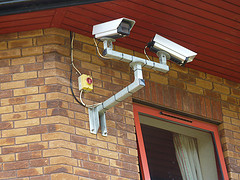Big Brother Nursing?
 Another set of eyes might be watching health care workers. Patients in intensive care need increased supervision; responding to this need, some critical care units are installing cameras in their ICUs. The idea is not to replace health care workers “on the ground,” but to support them. “Tele-ICU” nurses can monitor multiple patients at once and alert on-the-unit nurses and doctors to potential problems. In situations where seconds can make a significant difference in patient outcomes, tele-ICUs seem a no-brainer.
Another set of eyes might be watching health care workers. Patients in intensive care need increased supervision; responding to this need, some critical care units are installing cameras in their ICUs. The idea is not to replace health care workers “on the ground,” but to support them. “Tele-ICU” nurses can monitor multiple patients at once and alert on-the-unit nurses and doctors to potential problems. In situations where seconds can make a significant difference in patient outcomes, tele-ICUs seem a no-brainer.
Tele-ICUs, however, are not yet widely implemented or accepted. With cameras constantly watching, health care workers and patients might feel more vulnerable. It is not yet clear how ICU footage might play in malpractice lawsuits and nursing reviews. Patients might feel that cameras are an invasion of privacy.
On the other hand, tele-ICU programs have seen success where implemented. Health care workers can play back footage to double check when doses were given. Mistakes are caught sooner, and there is greater adherence to best practices. Mortality rates decreased.
While this technology and guidelines for its implementation are still in its infancy, more hospitals are installing tele-ICUs on a trial basis. What do you think of tele-ICUs? Would you be comfortable with cameras on you – as a patient or as a nurse?
Read more about this upcoming technology here, and be sure to visit the Stanbridge College website to find out more about a career in vocational nursing.